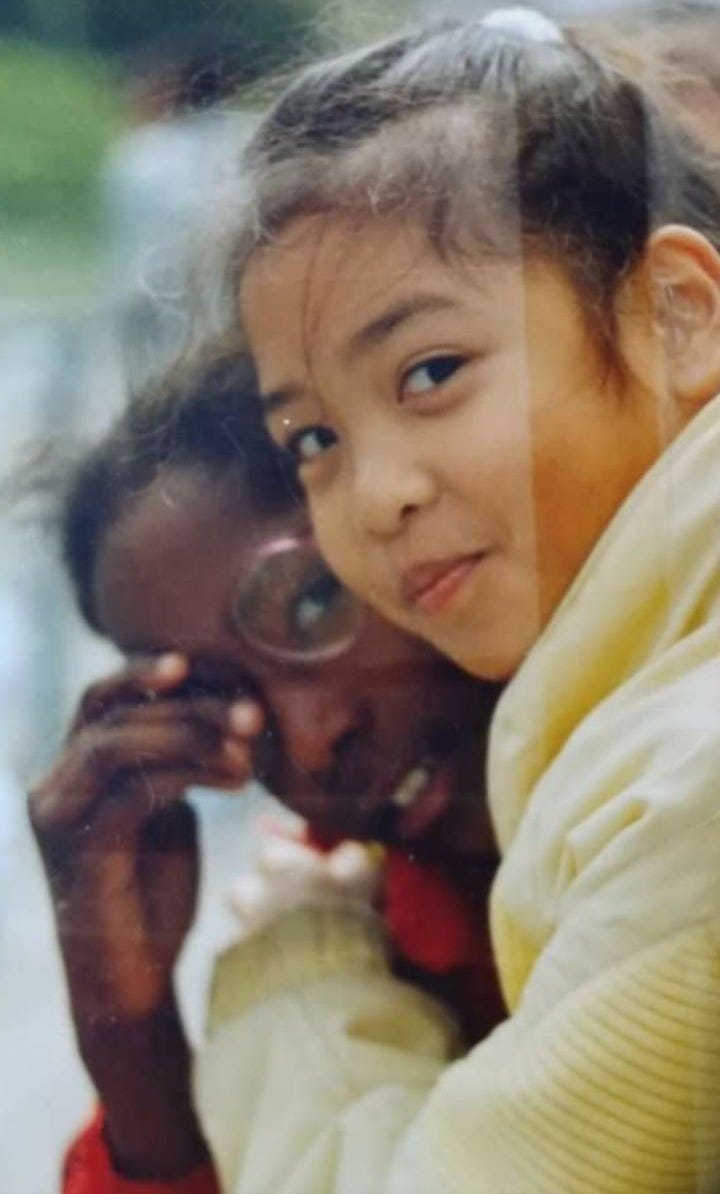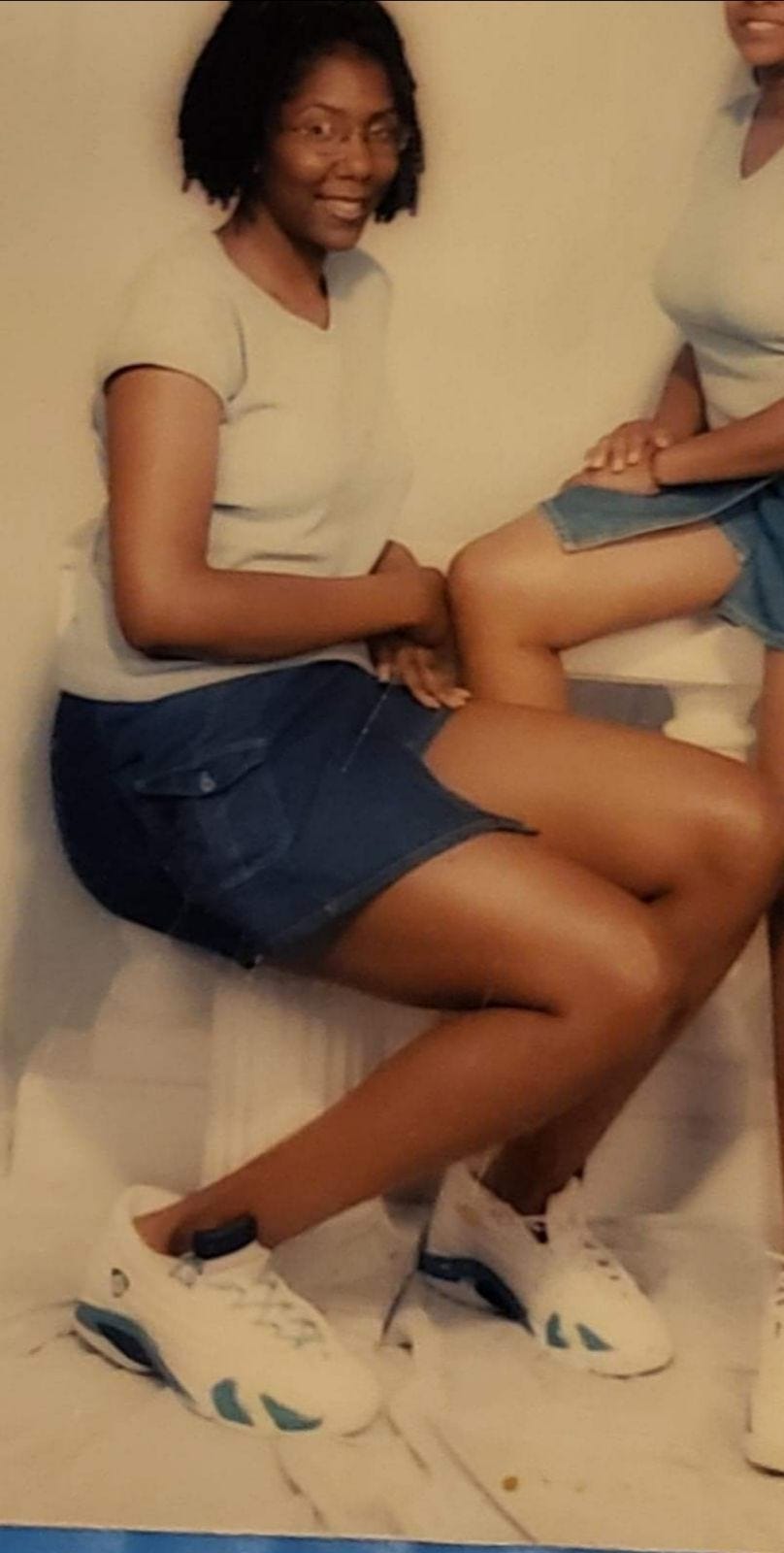A lesbian married to a man? writing on the expansiveness of lesbian life
I never thought this would be confusing. Honestly.
I got married to my best friend on May 27th, 2006. We met on move-in day at the University of Southern California back in August 2002. We were both student residents on the Somerville Place floor at school, also known as the “Black Floor.” When we met, I was wearing a gray Ecko Unlimited jogging suit with gray Jordan’s. He was wearing khaki shorts (which I would learn was a part of his regular uniform as a Black boy from Orange County, CA) and And1 tennis shoes. I truly thought he was a square. But, over the course of a few days, I felt drawn to him. We sat together on the bus that weekend, heading out for bonding events. We found each other in every crowd. And, we kept getting asked, “did y’all know each other in high school or something?”
At the time, I reveled in the discovery of this new person who I could spend every day with without getting annoyed. Though we came from very different communities (me from a very Black city and him from one of the whitest counties in America), we bonded over Brian McKnight’s “Never Felt This Way” and other Black cultural things. While I now understand myself to be neurodivergent and drawn to other neurodivergent people, at the time, I thought I had just found a friend who gets me. Someone I had been praying for while navigating Oakland as an unhoused survivor of sexual assault.
I had found a friend. More than anything else, he was my friend and I loved him.
In high school, I discovered two things about myself that I thought would always keep me from getting married to a man: 1) I was polyamorous, and 2) I was attracted to other girls. I figured out I was polyamorous when I liked two boys, one from church and one from biology class. I’ve written about it for Yes! Magazine. I always knew I was attracted to other girls or at least I knew since my first crush on a girl named Marlene at my Catholic elementary school. She was a funny Filipina girl who got me and always made the best jokes. One day, in third grade, I kissed her on her cheek during our reading period in the library. We were practicing Mavis Beacon so we could type faster than 70 words per minute.
When I kissed her cheek, she smiled at me. We were best friends and I loved her.
Since that first crush, I have found myself attracted to more girls/women and gender expansive people than boys/men. I got clocked by every masculine lesbian who I bumped into growing up. Still actively attempting to be the church girl my mother always dreamed of, I hid my desires away and pretended not to like anyone. When I dated boys, it was more an effort to keep them as an ornament to fend off other boys than it was about true interest. I still regret the way I used and abused some Black boys and men on my queerness journey.
My queerness has always been loud. I was over six feet tall by the time I was eleven years old. My favorite tennis shoe has always been Jordan’s. My parents often found themselves standing in line with me at Niketown when the new shoe dropped. I played basketball until I was diagnosed with Marfan Syndrome, a congenital connective tissue disorder that often weakens the veins, ventricles, and connective mechanisms in the heart. After I stopped playing basketball, I never stopped wearing Jordan’s. I abandoned straightened hair for natural styles and often wore an afro.
Growing up, anyone who was paying attention likely knew I was gay. I didn’t know it at the time, since everyone around me seemed a bit genderfluid and sexually open. But, after years of only feeling real attraction to other girls/women, I met Daren.
When Daren and I met, we were both sexually inexperienced. All of my sexual experiences with men/boys had been nonconsensual. I talk about this in detail in an article at Marie Claire. I thought he was asexual or queer (something he wouldn’t discover about himself until almost 13 years later). In him, I found a safe place to land after enduring abusive parents who abandoned me and living with housing insecurity for roughly two years between ages 16 and 18. I didn’t care about his gender and sexuality. I just cared that he saw me, he understood me, and, more than anything else, he loved me.
Our romantic and sexual relationship developed from this friendship. I found myself deeply in love with this straight-laced Black boy from Anaheim. I wanted to spend everyday with him, often cutting classes to attend his. We became inseparable. That was how we liked it. Over time, I came to realize that this would be the person whom I would want to raise children with. He became my person not because of either of our gender or sexuality but because we found a love that was kind, forgiving, enduring, and rooted in compassion.
Daren never asked me to be small or to change who I was. He understood me to be queer and polyamorous when we met, and those aspects of my identity never seemed to be a threat to his masculinity or personhood. I understood him to be a heterosexual and cisgender man who preferred monogamous coupling. And, we both understood ourselves as independent actors who each belonged to ourselves. We never concerned ourselves with the typical concepts of control, surveillance, and possession that came with toxic monogamy.
Over time, I identified as bisexual (from about age 16 to 28), then pansexual (from about 28 to 35), and then understanding myself as a lesbian after 35 years old. Daren came to identify as asexual around 2016 after we had been married for about 10 years. We both struggled through our new identities, finding alignment in the naming and community. And, as the romantic and sexual part of our relationship transitioned, we actually became closer. We have learned to build so many expansive forms of intimacy that do not involve sex and sexual pleasure. We shower together, take long baths (usually where we plan new episodes of our podcast), take regular walks, and spend time each day talking to each other as if we are long lost friends. He is my best friend. I love him.
Because I have never believed in the concept of a “soul mate” and have never internalized narratives around someone else “completing me", I am able to have a deeply loving and committed relationship with my best friend, coparent, and spouse even while maintaining loving and intimate relationships with women and gender expansive people. While I am no longer attracted to cisgender men and do not date or sleep with them, I have never felt compelled to leave or divorce my spouse. We have raised three incredible free Black children together, started a business, and written books. We play videogames and travel together as we have always done. When we are sick, we care for one another. When we are down, we hold one another.
I have never understood marriage to be about sex and attraction. I have always understood marriage as a formal contract with the state. “To have and to hold…” and all of that. I watched women in my family marry men they thought were sexy only to have those men abuse them and break their spirits. I have watched marriages of obligation grow boring, dull, and loveless. I have witnessed many people use someone else’s definition of love and marriage to build their own.
We rebuke that.
I am a lesbian married to an incredible, loving, beautiful Black man. A man who has nursed me through emergency open heart surgery and helped me learn to walk again both literally and metaphorically. I am married to man who has never needed me to be seen and not heard. Who has never challenged my intellect or diminished my accomplishments. I am married to a Black man who loves himself, his children, his life, and his future selves. I married well.
And, one day, when I meet the women or gender expansive people of my dreams, that man I married nearly twenty years ago will be standing there beside me, genuinely happy for me because he knows that no matter who or how I love, it will never change how I feel about him.
Read our interview with HuffPo for the Black Love on Our Terms Series.










